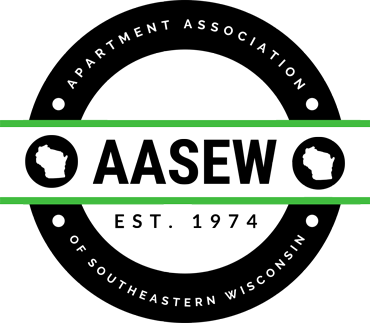Tristan is the Executive Vice President and shareholder with the law firm of Petrie+Pettit and focuses his practice in the area of landlord-tenant law representing landlords and property management companies throughout Wisconsin.
Call us: (414) 276-2850
A Summary of Landlord-Tenant Bills That Some In Madison Are Hoping to Get Passed in 2024
Posted by Tristan R. Pettit, Esq. in Legislation / Comments
Below is a summary of the many Landlord-Tenant law bills that were drafted in late 2023 and are hoping to move forward in 2024. You will note that many of these bills are trying to undue the many laws that were passed between 2012-2018 (i.e., Act 143, Act 76, Act 176, and Act 317). Whether or not these bills have any real possibility to become law now, it is clear that there has been a lot of work behind the scenes and that these bills represent what some in Madison are hoping to get passed sometime in the future.
If these are not the type of laws that you want passed then I suggest you get involved, join the Rental Property Association of Wisconsin, and start talking to your elected officials in Madison.
SB 655/AB 712: Rental Assistance
SB 655 proposes a substantial extension to the notice period, with tenants having a minimum of 30 days to pay rent or vacate. Moreover, landlords must apply for and be denied emergency rental assistance under a local, state, or federal assistance program, or be ineligible for such assistance before moving forward with the eviction process. In addition, SB 655 mandates that a court must stay eviction proceedings until the landlord files proof of applying for and being denied emergency rental assistance, or, in case where the landlord is ineligible for assistance, until mediation between landlord and tenant occurs. If either party has been approved for emergency rental assistance, the eviction proceedings must also be stayed. Finally, landlords receiving emergency rental assistance are prohibited from raising rent for 12 months, except to recover property tax increases for the tenant’s rental unit.
SB 656/AB 704: Defense of Waiver in Eviction Actions
If a landlord has accepted late rent payments in the past (a waiver), the tenant can now use this as a “waiver” argument to negate a termination notice that insists on strict performance of the rental agreement terms.
SB 657/AB 705: Extending Emergency Assistance Stay
When a tenant is facing eviction, Wisconsin currently only allows a judicial stay period of 10 days if the tenant applies for emergency assistance under the Wisconsin Works program. SB 657 would eliminate the 10-day time limit for tenants to get approved for state emergency rental assistance, even if a writ of restitution has been issued.
SB 658/AB 698: Tenant Right to Counsel
Residential tenants are granted the right to legal counsel at taxpayer expense. Rental agreements must inform tenants of their right to counsel in eviction cases. If the tenant doesn’t waive counsel, the court is compelled to appoint an attorney and halt proceedings. The stay remains in effect until counsel is appointed, and the tenant retains possession of the premises throughout this process.
SB 659/AB 701: Evicting Tenants for Failure to Pay Rent
Currently, landlords can terminate a tenancy by giving tenants a 5-day notice to pay rent or vacate. This bill extends this grace period significantly to 30 days. Current law also says accepting payment from a tenant after initiating an eviction action doesn’t necessarily lead to the dismissal of the case. SB 659 alters this by requiring the dismissal of an eviction action if the tenant pays all rent owed, along with any other payment mandated by the court.
SB 660/AB 699: CCAP Information
Under current law, the director of state courts is prohibited from removing case management information for eviction actions from CCAP for extended periods (10 or 2 years), whether or not the action results in a money judgement or a writ of restitution. This bill eliminates the prohibition related to dismissed actions, meaning that even if an eviction action is dismissed without a money judgement, the defendant names will be promptly redacted.
SB 661/ AB 703: Eviction Stipulations
Currently, a landlord and tenant in a small claim’s eviction can settle and stipulate to a judgement of dismissal. Under SB 661, if a stipulation is entered, the court may now vacate the stipulated judgement only if prior written notice is provided to the noncomplying party. Additionally, the court is prohibited from entering judgement against the noncomplying party unless specific conditions are met, including the application by the complying party, filing proof of noncompliance, and conducting an evidentiary hearing. Current law does not require notice to the noncomplying party before a motion to vacate the stipulation.
SB 662/ AB 700: Tenant Property Disposition
This bill repeals the current law that property left behind by an evicted tenant is presumed abandoned. Instead, if a tenant gives any indication that the property has not been abandoned, the property must either be stored or the tenant given a 30-day notice of disposal, per the previous statues from 2009. Tenants could be charged for storage, disposal of, or sale of property, but these charges would be limited to a “reasonable rate” set by DATCP.
SB 663/AB 702: Allowing small claims to Hear Illegal Lockout Cases
Illegal lockouts occur when a tenant is forced out of a residence without proper court process, by means such as removal of doors, locks, or windows, making the residence uninhabitable. These are known as extrajudicial or “self-help evictions.” SB 663 extends the purview of small claims court to include actions initiated by tenants seeking relief from extrajudicial evictions. The bill also empowers the court to grant a temporary injunction against a landlord or their agent if they have removed or attempted to remove the tenant or their belongings from the process as part of an extrajudicial eviction.
SB 664/AB 713: Eviction Notices
Currently, if a landlord provides notice of termination of a tenant’s tenancy due to failure to pay rent or other amounts due under the rental agreement, and the notice contains an incorrect amount due, the notice remains valid unless the notice is intentionally incorrect, or the tenant paid an amount they believe is due. SB 664 repeals this provision. Further, this bill changes the official notification date from the second day after the eviction notice is mailed to the 5th day after the notice is mailed. Finally, SB 664 repeals the provision that allows landlords to provide proof of certified mailing instead of an affidavit of service when filing a complaint in small claims court or in an eviction action.
SB 665/AB 709: Short-term Rental Restrictions
Under current law, municipalities may limit the total number of days that a residential dwelling may be rented to no fewer than 180 days. SB 665 limits the total number of days that a residential dwelling may be rented to no more than 90 days.
SB 666/AB 694: Tenant Organizing Rights
Creates a right to organize and engage in various activities aimed at aiding tenants. Landlords and their agents are prohibited from interfering with organizer activities or discriminating or retaliating. Penalties include a $10,000 forfeiture for each violation.
SB 677/AB 706: Rent Abatement and Retaliatory Conduct
Under current law, tenants can only partially withhold rent when their rental is in disrepair, affecting health, safety, or use and occupancy. SB 677 would create a rent abatement schedule and allow tenants to abate rent fully. Any action taken by landlord, such as a rent increase or eviction action, is presumed to be retaliatory if the tenant has complained about defects in the past 12 months.
SB 673/AB 708: Repeal State Prohibition on Local Inspection Regulations
Current law limits the authority of municipalities to require inspection of rental properties. Inspections must be initiated by a complaint or a special inspection warrant, or be performed under a schedule of inspections that meets a number of requirements specified in the statutes. SB 673 repeals these restrictions and gives local governments the ability to reinstate their own rental inspection programs.
SB 670/AB 707: Repeal Local Government Eviction Moratorium
Wisconsin municipalities are currently prohibited from enacting or enforcing an eviction moratorium ordinance. SB 670 repeals this statutory prohibition. This would apply to residential or commercial property.
SB 634/AB 714: Housing Discrimination and Prior Evictions
Under LRB 3918, it would be considered discrimination under Wisconsin’s open housing law to ask about evictions that occurred more than 5+ years prior. This bill would also consider refusal to rent or treat a renter unequally based on an eviction that is 5+ years old as discrimination and allow the individual to bring a civil action.
LRB 0431/AB : Legal Services Grants
Under LRB 0431, the DOA is required to establish a statewide grant program to provide funds for attorneys to provide legal services for low-income tenants in eviction actions in which the tenant alleges they were wrongfully evicted. These grants would be available to a tenant whose family income is at or below 200 percent of the federal poverty line.
LRB 0427/AB : Housing Discrimination
Under current law, discrimination in housing based on sex, race, color, sexual orientation, disability, religion, national origin, marital status, and family status is illegal. This bill adds citizenship and immigration status to the list of characteristics on which it is unlawful to discriminate in housing.
SB 726/AB 696: Rent Abatement
Current law allows tenants to abate rent when the rented property is damaged or has a condition that is hazardous to their health or safety. This bill allows DATCP to dictate the specific items for which a tenant can demand rent abatement and determine the amount of that abatement.
LRB 3889/AB : Residential Leases
This bill prohibits the termination of a lease or a refusal to renew a lease without good cause. Second, it requires 60 day notice if a lease will not be renewed. If also requires renewal leases to cover the same period as the expiring leases. Finally, if a tenant originally signed a lease of less than one year, LRB 3889 allows tenants to continue renting month-to-month but only if they are offered a renewed lease for the same period of the expired lease.
SB 821/AB : Rent control and Inclusionary Zoning
Current law prohibits municipalities from regulating the amount of rent or fees charged for residential property and from imposing inclusionary zoning requirements. This bill eliminates these prohibitions.




